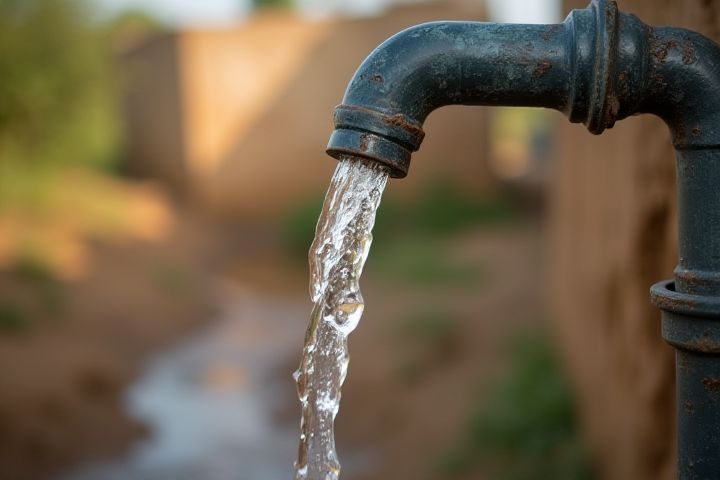
Nigeria's water supply system is characterized by its complexity and regional disparities. The country relies heavily on surface water sources, such as rivers and lakes, with the Niger and Benue Rivers being the most significant. Despite ample water resources, approximately 60 million Nigerians lack access to safe drinking water, largely due to inadequate infrastructure and poor management. In urban areas, groundwater is increasingly tapped to meet rising demand, but contamination risks remain high, affecting public health. Sustainable practices and investment in water supply infrastructure are crucial for improving access and ensuring the long-term viability of water resources in Nigeria.
Infrastructure challenges
Nigeria faces significant infrastructure challenges impacting its water supply system. Limited access to safe drinking water affects over 70 million people, exacerbated by aging pipelines and insufficient treatment facilities. Urban areas suffer from inconsistent water distribution, while rural communities often rely on unregulated sources, increasing health risks. Addressing these issues requires substantial investment in sustainable infrastructure development and management practices to enhance water accessibility and quality for all citizens.
Population growth impact
Nigeria's rapid population growth, projected to surpass 400 million by 2050, significantly impacts the country's water supply system. Urban areas, such as Lagos and Kano, face mounting pressure on existing infrastructure, leading to inadequate access to clean water for millions. Rural communities struggle with a lack of distribution networks, exacerbating health issues stemming from waterborne diseases. Addressing these challenges requires sustainable policies and investment in water management technologies to ensure reliable access for every Nigerian.
Rural vs urban access
Water supply in Nigeria reveals a significant disparity between rural and urban access, highlighting the challenges faced by diverse populations. Urban areas often benefit from better infrastructure and improved services, with approximately 75% of residents having access to clean water. Conversely, rural communities struggle with inadequate facilities, with less than 30% enjoying reliable supply, leading to health risks and socioeconomic challenges. This imbalance necessitates targeted investments and policy reforms to enhance water accessibility and quality for all Nigerians, ensuring that your community can thrive regardless of its geographical setting.
Water quality issues
Water supply in Nigeria faces significant challenges, particularly concerning water quality, which directly impacts public health and sanitation. Contaminated sources, including rivers and boreholes, often lead to diseases such as cholera and typhoid, with millions affected annually. The lack of proper waste management and industrial pollution further exacerbates these water quality issues, making it essential for communities to implement effective water treatment solutions. Ensuring access to clean, safe drinking water is crucial for improving health outcomes and quality of life across Nigeria.
Government policies
In Nigeria, government policies play a critical role in addressing the challenges of water supply and sanitation. The National Water Policy, established to ensure sustainable and equitable access to safe water, aims to regulate water resources through effective management practices. Investment in water infrastructure, driven by public-private partnerships, focuses on improving distribution systems to rural and urban populations. Your awareness of these policies can help you advocate for better water management practices in your community, promoting health and economic development.
Private sector involvement
The water supply sector in Nigeria increasingly relies on private sector involvement to enhance efficiency and service delivery. Public-private partnerships (PPPs) aim to improve infrastructure and management practices, addressing the growing demand for clean water due to rapid urbanization. Companies are investing in technologies such as desalination and water recycling, ensuring sustainable access to safe drinking water. You can explore various initiatives that empower local communities through public engagement and regulated water pricing models, fostering accountability and sustainability in water distribution.
Climate change effects
Nigeria's water supply system faces severe challenges due to climate change, including increased droughts and erratic rainfall patterns. These environmental shifts lead to reduced water levels in rivers and lakes, exacerbating the struggle for potable water in urban and rural areas alike. The rising temperature also affects water quality, promoting the growth of harmful algal blooms and impacting public health. It is crucial for local governments and communities to implement sustainable water management practices to mitigate these effects and ensure access to clean water for all Nigerians.
Funding and investment needs
The water supply system in Nigeria faces significant challenges, necessitating urgent funding and investment to improve infrastructure and access. Many regions lack reliable sources of clean potable water, contributing to health issues and economic stagnation. Strategic investments in water treatment facilities, pipelines, and distribution networks are essential for enhancing the quality and availability of water resources. By prioritizing financial support for sustainable water projects, you can contribute to a healthier population and a more robust economy.
Technological innovations
Technological innovations are transforming water supply systems in Nigeria, enhancing access to clean drinking water for millions. Smart water management solutions, such as remote sensing and Internet of Things (IoT) devices, provide real-time data on water quality and availability, enabling efficient resource allocation. Solar-powered pumping systems are being implemented in rural areas, drastically reducing reliance on fossil fuels and improving sustainability. By investing in these advancements, Nigeria not only addresses water scarcity but also boosts economic growth and public health.
Non-Governmental Organization roles
Non-Governmental Organizations (NGOs) play a crucial role in improving water supply in Nigeria, addressing challenges such as inadequate infrastructure and limited access to clean drinking water. These organizations actively implement community-based projects that promote sustainable water management practices, ensuring that rural and urban populations have reliable access to hygienic water sources. By partnering with local communities, NGOs enhance awareness of water-related health issues and promote sanitation education, leading to better public health outcomes. Through funding, advocacy, and innovation, you can see how these NGOs contribute significantly to enhancing water supply systems and fostering resilient communities across Nigeria.
